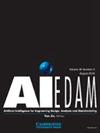通过强化学习实现石材砌体设计自动化
IF 2.3
3区 工程技术
Q3 COMPUTER SCIENCE, ARTIFICIAL INTELLIGENCE
Ai Edam-Artificial Intelligence for Engineering Design Analysis and Manufacturing
Pub Date : 2023-06-13
DOI:10.1017/S0890060423000100
引用次数: 0
摘要
摘要利用当地的天然和再生原料有利于可持续建设。然而,与通用工程砖不同,天然和再生原料由于其随机性、连续性和异质性,涉及设计挑战。例如,砌石的实际应用是有限的,因为它仍然依赖于具有整体领域知识的人类专家来确定不同尺寸/形状的天然石头的顺序组织。强化学习(RL)有望解决此类设计挑战,因为它允许人工智能(AI)代理自主学习设计策略,即在每个时间步长确定最佳设计决策。作为涉及异构原料的设计自动化的概念验证RL框架,提出了一个砌石设计框架。所提出的框架是建立在一个虚拟设计环境MasonTris上的,其灵感来源于砖石和俄罗斯方块之间的类比。MasonTris提供了一个类似俄罗斯方块的虚拟环境,并结合了有限元分析(FEA),人工智能代理在这里学习有效的设计策略,而无需人工干预。此外,还设计了一种新的数据收集策略,即几乎贪婪策略,以解决可行设计的稀疏性问题,从而实现更快/稳定的学习。由于并行代理评估具有不同复杂性的设计时会出现计算瓶颈,因此提出了对RL框架的修改,即在检索到用于训练的训练数据之前保持有限元分析。通过不断改进简化设计问题中的砌石设计策略,证明了所提出的框架的可行性和适应性。通过结合更现实的假设,该框架可以推广到不同的天然和回收原料,为可持续性的设计自动化开辟了机会。本文章由计算机程序翻译,如有差异,请以英文原文为准。
Stone masonry design automation via reinforcement learning
Abstract The use of local natural and recycled feedstock is promising for sustainable construction. However, unlike versatile engineered bricks, natural and recycled feedstock involves design challenges due to their stochastic, sequential, and heterogeneous nature. For example, the practical use of stone masonry is limited, as it still relies on human experts with holistic domain knowledge to determine the sequential organization of natural stones with different sizes/shapes. Reinforcement learning (RL) is expected to address such design challenges, as it allows artificial intelligence (AI) agents to autonomously learn design policy, that is, identifying the best design decision at each time step. As a proof-of-concept RL framework for design automation involving heterogeneous feedstock, a stone masonry design framework is presented. The proposed framework is founded upon a virtual design environment, MasonTris, inspired by the analogy between stone masonry and Tetris. MasonTris provides a Tetris-like virtual environment combined with a finite element analysis (FEA), where AI agents learn effective design policies without human intervention. Also, a new data collection policy, almost-greedy policy, is designed to address the sparsity of feasible designs for faster/stable learning. As computation bottleneck occurs when parallel agents evaluate designs with different complexities, a modification of the RL framework is proposed that FEA is held until training data are retrieved for training. The feasibility and adaptability of the proposed framework are demonstrated by continuously improving stone masonry design policy in simplified design problems. The framework can be generalizable to different natural and recycled feedstock by incorporating more realistic assumptions, opening opportunities in design automation for sustainability.
求助全文
通过发布文献求助,成功后即可免费获取论文全文。
去求助
来源期刊
CiteScore
4.40
自引率
14.30%
发文量
27
审稿时长
>12 weeks
期刊介绍:
The journal publishes original articles about significant AI theory and applications based on the most up-to-date research in all branches and phases of engineering. Suitable topics include: analysis and evaluation; selection; configuration and design; manufacturing and assembly; and concurrent engineering. Specifically, the journal is interested in the use of AI in planning, design, analysis, simulation, qualitative reasoning, spatial reasoning and graphics, manufacturing, assembly, process planning, scheduling, numerical analysis, optimization, distributed systems, multi-agent applications, cooperation, cognitive modeling, learning and creativity. AI EDAM is also interested in original, major applications of state-of-the-art knowledge-based techniques to important engineering problems.

 求助内容:
求助内容: 应助结果提醒方式:
应助结果提醒方式:


